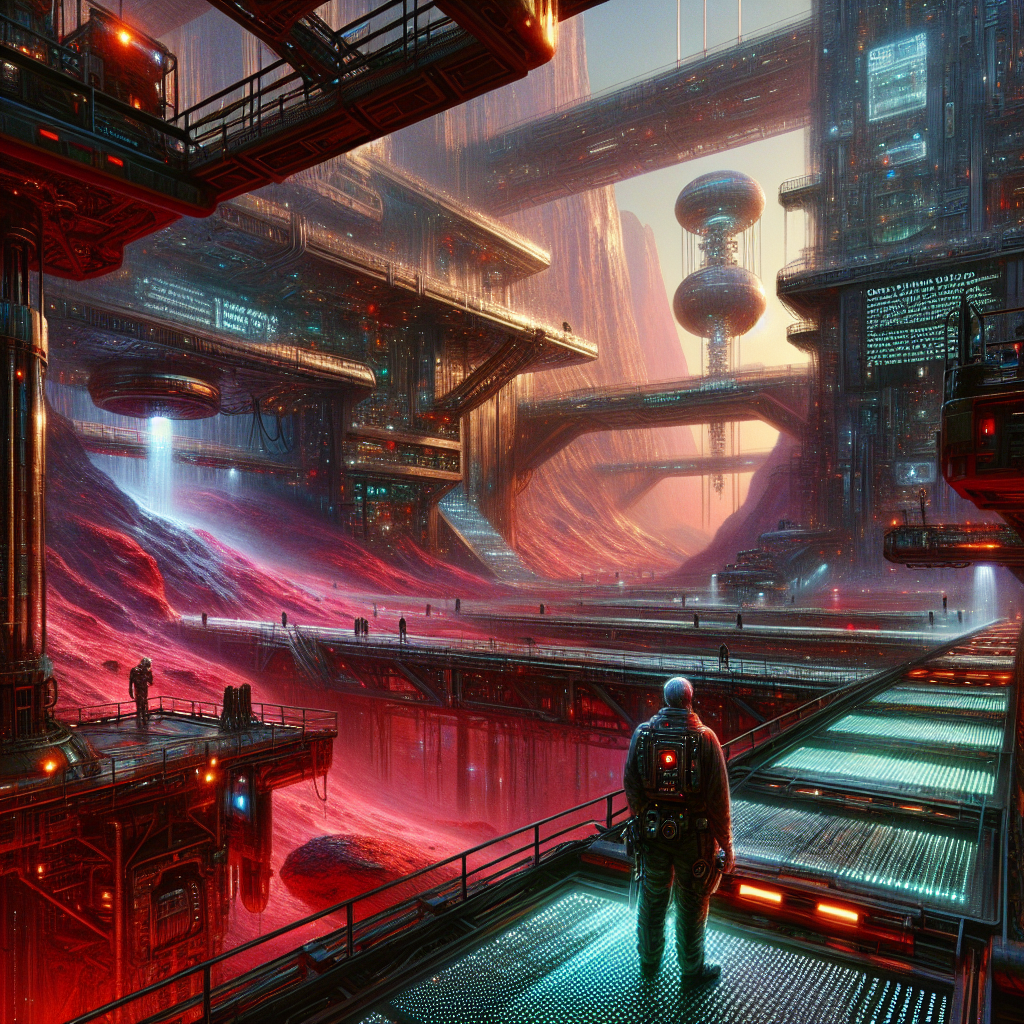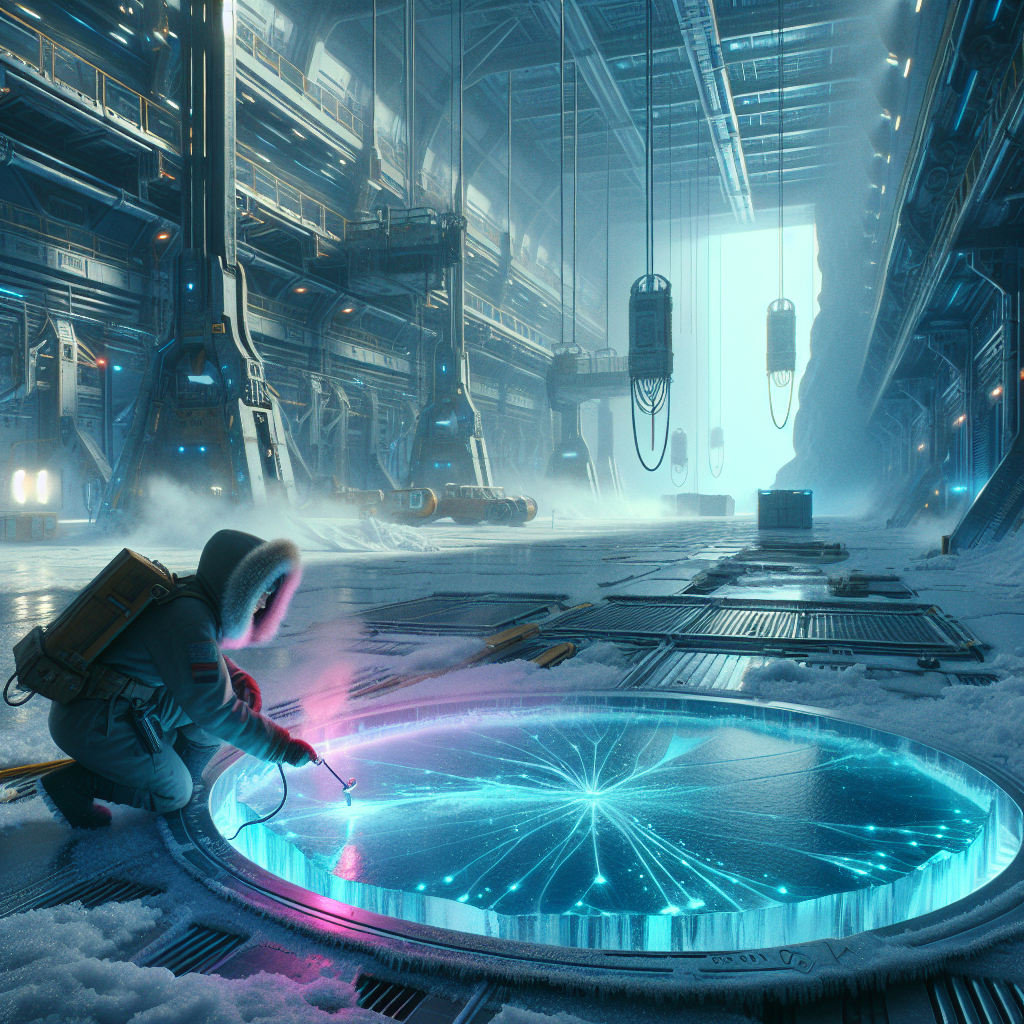CHAPTER 1 - The Red Gate at Midnight

When a daring night-time theft strikes Ferrari’s Maranello facility, Interpol agent Patrizia “Pat” Robbiani is pulled from her father’s Modena restaurant and into a chilled corridor of humming laboratories and nervous engineers. Dressed in bold red and armed with a dry wit, she reads the scene like a palimpsest: a cloned access badge, a folded carbon fiber sliver from a high-end flight case, a mysteriously timed camera blackout, and a fiber-optic tap disguised as an innocent cable tie. She enlists her quieter, brilliant twin, Lianca, to parse badge frequencies and surveillance logs. As Pat follows scented traces and compositional dust to the perimeter, whispers from a junior engineer hint at “Project Aegis,” a secret cross-brand initiative that might make the theft far more consequential than one company’s loss. An anonymous message showing a feed from her father’s kitchen strikes at her heart, warning her off or daring her on. A paper clue with chess notation, coordinates for the Côte d’Azur, and a drone’s dropped token engraved “HELIOS” suggest an operation spanning borders and brands. The chapter ends as a second alarm sounds from another Italian supercar facility, implying a connected blitz and a looming automotive espionage war.
The dinner rush at my father’s restaurant tapered off into the velvet-hour hush that Modena keeps for itself, a lull between engines and espresso. Designers in tailored navy had left fingerprints of truffle oil on gleaming forks, and two retired racers traded lap stories over Barolo until the last bottle sighed empty. I slipped out of my shoes at the family table near the window, toes grateful, black dress skimming my knees and a red leather jacket flung over the chair like a flag. My father’s laughter drifted from the kitchen, a warm counterpoint to the muted whine of a V12 being tuned somewhere in the city.
The phone on my lap buzzed with an austere, coded tone I knew too well, and I felt the surge of adrenaline like metal on tongue as the Interpol liaison from Milan said, ‘Maranello. Now.’
I was on the street in minutes, jacket on, hair twisted into a knot that looked careless but never was. The Giulia Quadrifoglio purred awake, a carnivore clearing its throat, and I threaded through sleeping streets where cobbles remembered a thousand test drives. Fog lifted off the fields on the road to Maranello, a ribbon of low clouds that turned the roadside poplars into silhouettes like watchmen.
Ahead, the Prancing Horse at the gate cut a sharp silhouette against floodlights, a lit sigil over a kingdom that smelled faintly of hot rubber and machining oil. Fiorano lay silent beyond the fence, a dark loop under a thin moon, like a ring waiting for a match to begin. Security badges clicked and the guard’s eyes widened with the recognition that softened reluctance. Inside the compound, a Carabinieri Alfa idled with its blue light sleeping and a man with gray precision in his side-part shook my hand: Marco Santori, head of on-site security, nerves disguised as professionalism.
‘It’s not media,’ he said in a murmur, as if sound might jostle the evidence. ‘A drive. Prototype control maps. The hybrid system’s brain—it’s gone.’ He glanced toward a sterile corridor where the hum of cooling fans sounded like breath held too long.
The lab was brushed steel and good intentions, the kind of sterile that makes fingerprints feel like confessions. A line of monitors stared back with blank, blue patience; a chair was slightly off center; a half-drunk espresso sat wide of its saucer, the crema ringed with the blurred crescent of someone in a hurry. Near the access door a dark gleam caught my eye where the gasket kissed the frame: a sliver of carbon fiber, thin as a shaving and edged sharp, lodged in the paint. I eased it out with a nail, careful not to breathe too hard, and felt the texture—not from a chassis panel, but from a high-grade flight case, the kind you buy to move jewelry or prototypes that travel first class.
‘We ran a fire drill at 02:10,’ Santori said, voice tight. ‘Evacuation to the muster point. Someone reentered on a staff badge while the team was outside. Six minutes, then the server door shows accessed and relocked.
No cameras inside.’ A lead calibration engineer hovered near us, clean-shaven but stubbled in spirit, his stare a woodpecker’s at the floor. I put a hand on the back of his chair and dropped my tone to something warm. ‘You look like you could tune an orchestra,’ I told him. ‘So what note was false tonight?’ He exhaled and blinked, and the room breathed with him.
Sincerity is my crowbar. It opens things. He confessed the thing he’d nearly swallowed: he’d propped the door with a binder during the drill because the magnet sometimes stuck, habit is a quiet saboteur. The access logs pulled up on the terminal were an unkind mirror—clean columns of time and badge IDs, one of them belonging to a retired upholsterer whose last day was three Junes ago.
‘He died last winter,’ the engineer said, shoulders in a remorseful shrug. The ID beeped a return at 02:17 with a reader profile showing a frequency drift—barely perceptible, but off enough to smell counterfeit. I shot a message to my sister with a photo of the waveform and dialed before my thumb left the screen. Lianca’s voice arrived covered in the hush of her apartment, Milan blurred behind triple-glazed glass, the faint crispness of a woman who had been typing at a keyboard in a sweater worth more than my car’s tires.
‘You’re early,’ she said, and I could hear a smile that only existed for me. ‘You’re late,’ I answered, because twins like to keep balances neat. We talked in shorthand—badge clones, subcarrier anomalies, the way an amateur sets a rate by ear and a professional lets a device do it for them. ‘It’s a Nerezza-6 clone,’ she decided after a minute, pleasure in her voice when an equation falls flat into a solution, ‘and your camera network has a seventeen-second blackout at 02:13, corridor E.
Not a power cut. Someone looped the feed.’
Corridor E was pale and polished, the kind of hallway that pretends it has nothing to hide. I listened to the wall as I walked, not for sound but for the weight of the air, and the junction box beside the ceiling vent had a cable tie whose serrations were too clean. Snipping it free, I found the tiniest bite of fiber optic threaded through the inside, slick as hair, a tap so elegant it felt vaguely impolite to touch.
The micro-transceiver glued in the tie-head was Swiss-made, the rack marks filed away to a haphazard anonymity that only expensive hands bother with. I caught the faintest lift of jasmine from the adhesive lacquer and memory placed it: a thief Interpol had almost met twice, a woman whose calling card was a scent and a laugh, a rumor named La Gelsomina. Outside the service door, the night air had baked-refrigerator chill and the gravel gave up its story if you knew how to ask. A series of compressed impressions spaced in careful steps tracked along the fence, light weight but certain, soles that didn’t belong to a worker’s boots.
Crouching, I brushed a bloom of pale dust from one print onto a swab, watched it cling to the fibers in a way that made my scalp listen. Inside, under the microscope, the dust showed ceramic shards too uniform to be random—a composition like the brake dust from Pagani ceramic-carbon discs, mixed with a fine translucent grit common to a particular industrial floor epoxy. Someone had come here from somewhere they shouldn’t have been, and left with the arrogance of thinking disciplines don’t cross-contaminate. In the control room a young engineer with a mop of hair and an almost-apology to his posture tugged the sleeve of my jacket with a hand that trembled.
‘Dario,’ he said, as if a name would make a person. He spoke too quickly about rumors he didn’t trust himself to keep: a project that didn’t officially exist, whispered in workshops where lathes drowned words—Project Aegis, a consortium across brands to harden the brains inside our machines. ‘If you can break one car,’ he said, eyes big, ‘you can break them all, unless they stand together.’ Last week, he added, a consultant from Geneva had toured the labs in a suit that looked like he owned the building and wore a lapel pin shaped like a sunburst no one could place. My phone vibrated with the fierce certainty of a thing that intends to be answered.
The screen filled with my father’s kitchen, steam rising from a copper pan, the neat violence of a chef’s knife coming down on parsley, the old clock over the stove with its enamel numbers like teeth. For half a breath my heart went blind. I hit call on my father’s contact and he picked up on the second ring, laughter still in his voice because they had just extinguished the flambé on a last dessert and the staff’s jackets were undone. ‘Tesoro, we’re closing,’ he said, and I listened to the distinct clatter of our familiar kitchen, different from the one on my screen by the angle of a ladle and the slow swaying of a ceiling cord—a recorded loop, time-stamped three minutes into the future.
Invisible eyes breed steel in me. I sent the feed to Lianca and felt the heat of her anger through a bandwidth too thin for rage. ‘They want your attention divided,’ she said, calm returning like a tide as she compared pixel noise and clock flicker. ‘And they want to see how you move when cut.’ I walked slower after that, not for them but for me, and went back into the lab where the brutal minimalism had acquired the intimacy of violated space.
Behind the server rack that once held the drive, I found a single sheet folded tight as contraband, tucked under the lip by a hand that knew better than to leave anything—and did anyway, or wanted to. On the paper was one line in neat block letters: E4. A chess opening, the cleanest way to stake claim to the center. Beneath it, in pencil that looked timid in comparison, a set of coordinates: 43.7412 N, 7.4295 E, the Côte d’Azur, where the sea makes light into knives and money pretends to be innocent.
A tiny screw in the rack head turned with a resistance that felt like secrets, and a microSD card sprang into my palm, faceted like an insect’s idea of treasure. I pocketed it before anyone else saw and told Santori I needed the roof, which earned me a look and a nod because no one wants to admit they might need the sky. The air up top was colder, honest with the stars in it, and the roofs below made a chessboard of pitched angles and vents. I heard it before I saw it, the high, wasp-fine whine of a drone skating around a corner of the building with a courtesy that made me want to applaud.
It dipped to regard me, bold as a hummingbird, then lurched upward—too fast to catch but not too fast to lose something. A metal token clinked on the gravel by my boot, brass worn soft at the edges, engraved with a circle of lines like rays around a dot—a helios mark, a sun that burned on paper and lapel pins and now my palm. Somewhere below, an alarm began another life, not ours—the tenor shift that means a different system, a different building. Santori’s radio snapped to attention with a skitter of panic, and his face turned the color of a man calculating which fire to drown with bare hands.
‘San Cesario—Pagani,’ he said into the vacuum, voice flat with the effort of not being afraid. My mouth went dry and I couldn’t help the smile that came, savage and terrible in its understanding: we were no longer guarding a jewel box but a fault line. Was someone orchestrating an automotive war?











































































